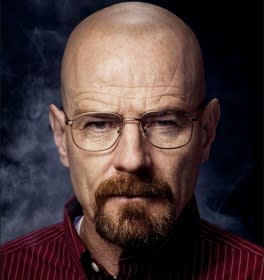Bryan Cranston’s Independent Movie Theater Has Had It With Those Stupid Big Chains

It's unfortunately a familiar story: A local independent theater struggles to find an audience because of competition from bigger nearby chains. But few local independent theaters are co-owned by the Emmy-winning star of "Breaking Bad" and a co-producer of the Oscar-winning "Ray." But that's the case with the Cinémas Palme d'Or, a 10-screen theater in Palm Desert, which is nearby Palm Springs, California. Named after the top prize at the Cannes Film Festival, the Palme d'Or offers indie and art-house fare along with the occasional big-budget picture. And it's run by, among others, actor Bryan Cranston and producer Alise Benjamin. And they're getting sick of being stiffed on movies they claim a rival theater is blocking them from getting. So they're suing.
The lawsuit, according to the Los Angeles Times, "alleges that Cinemark, which operates the 15-screen River Cinema in nearby Rancho Mirage, is illegally muscling them out of the marketplace by threatening to retaliate against movie studios that book films into the Palme d'Or." An appellate court will be hearing the case, although no trial date is set yet.
"It's like they're Starbucks and we're a small coffee house and they're preventing us from getting our coffee beans," Cranston told the L.A. Times. "We're fighting for our existence."
At the heart of the lawsuit is a question of what's known as "circuit dealing," which is an illegal action where a chain tells a distributor that they won't play their movie in their theaters unless they agree to keep it from screening at a competitor's local theater. Cinemark has argued that they've done nothing unlawful and that they don't have the clout to stifle competition anyway.
Still, the lawsuit helps highlight a problem a lot of independent chains face. For local theaters to survive, they've got to show a "Transformers" or "Pirates of the Caribbean" just to bring in enough money to make up for the losses they could incur for taking a risk on a "Love Crime" or "Gainsbourg." But if big chains keep the small theaters from showing "Transformers," they could be sunk. Ironically, it's not the boutique films, which help give a small theater its identity, that are the problem: It's something like "Paranormal Activity 3."
For the last several years, there's been a rash of articles about the troubles facing small independent theaters. Their older audiences, who used to flock to the latest foreign-film sensation, are slowly dying off, and younger crowds are more interested in seeing those movies on-demand or on DVD. Indie distributors are deciding that it's not worth the cost of making prints available for some of their more obscure art-house offerings, bypassing theaters altogether. And now that medium-sized and larger chains make room for one or two "art-house" movies, there's less need to check them out at your mom-and-pop theater, which doesn't have the fanciest stadium seating or sound systems. But without the deep pockets or high profile, most of these smaller theaters have had to fight a losing battle against big, powerful companies. Good thing that the little guys have Walter White on their side.
Flagship Theatres' Cinemark lawsuit a test for independent chains [Los Angeles Times]

